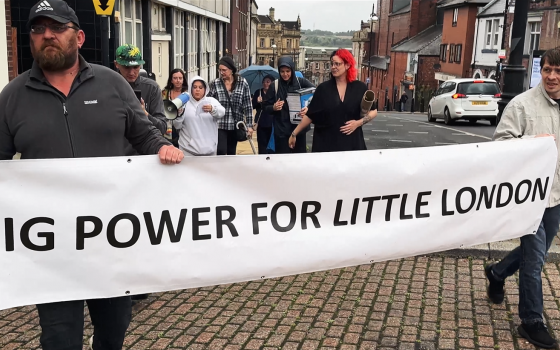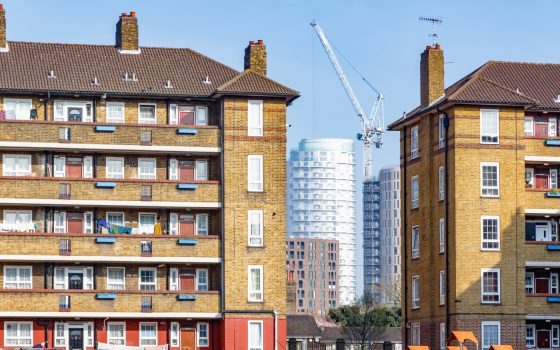A step in the right direction for rent controls in London
Whoever becomes the next mayor will need to rise to the challenge of the capital's affordability crisis
03 March 2020
Today, the Mayor of London Sadiq Khan has thrown down a challenge to other London Mayoral candidates to make May’s election a referendum on controlling London’s runaway rents. Sian Berry, the Green Party mayoral candidate, has called for a rent freeze akin to that in Berlin and vowed to never stop pressing Khan to call for more radical rent controls. Whether other candidates accept this challenge remains to be seen, but there is a very compelling case for the next mayor to tackle the very high sums 2.4 million Londoners pay to rent their homes.
The problem is that the Mayor doesn’t currently have the powers necessary to introduce controls on rents. As the incumbent, Khan is hoping that he can turn votes for him into a mandate for government to hand over the necessary powers so that London mayors can take action on the private rented sector. It is currently one of the least regulated in Europe. While some other UK cities face affordability challenges, others face challenges in house quality in the private rented sector. NEF welcomes the Khan and Berry’s calls for devolved powers to mayors, and thinks that all mayors should have increased powers to deal with the housing crises they face in their communities.
Whether or not other candidates see rent controls as the defining issue of the campaign, the focus is welcome. Affordability is the major issue for London’s 2.4 million renters, who will soon outstrip homeowners by number in the city. The median rent for a two bedroom flat is 50% of London’s median income, well above the widely used yardstick of affordability of around a third of net household income, and rents have risen three times faster than incomes over the past decade. Affordability is far worse in London than much of the rest of the country, with the average private rent for a one-bedroom home in the capital now more than the average for a three-bedroom home in every other English region.
The reality of unaffordable rents for many is to make every day a struggle and to significantly increase hardship for the capital’s low income residents. High rents have become a major driver of poverty and inequality. In the three years leading up to 2015/16, 960,000 private renters were living in poverty, and 43% of the Londoners experiencing in-work poverty were private renters. Over half of children growing up in private rented housing are living in poverty, and the high housing costs for private renters are increasingly coming to define life chances.
A growing number of voices are calling for rent controls as part of the solution to London’s housing affordability crisis. 68% of Londoners are in favour, and a growing private renters’ movement, with the London Renters Union at its forefront in the capital, is demanding a fairer, more affordable private rented sector in London.
In 2019 we worked with the Greater London Authority to develop a blueprint for rent controls for London. Our research underpinned the Mayor’s call for powers for rent controls last year, and he is now centring this call in the upcoming election.
Our report, makes the case for an approach that puts economic and social justice at the heart of rent regulation, while taking seriously the inherent risks in imposing rent controls. Based on our analysis of rent control policies from around the world, from Berlin to Amsterdam to New York, we outlined six building blocks that should form the basis of any sustainable, effective rent control policy for London, which include setting a desired rent level, linked to wages and other costs of living, and establishing an independent body to oversee rent control policy:
- A landlord and rents database: An open-access record of all landlords, their properties, and associated rents. Data availability is a key weakness in other countries’ rent control policies, including Scotland where rent control policy exists but cannot be enacted because of a lack of data. Improved data availability on actual market rents is an essential first step to addressing the problem.
- A property-linked rent control: to control rents between and within tenancies, so that landlords can’t just raise rents to market levels every time they get a new tenancy.
- Desired Rent Level: to reduce rents for individual privately rented properties over specified time period. Rent control should make rents more affordable, as well as limiting runaway growth.
- A Private Rent Index: to govern annual rent changes on privately rented properties, once the Desired Rent Level has been reached. This index might take into consideration local wage growth, house price indexes, wider consumer inflation, borrowing costs, and other relevant variables to determine an affordable percentage rise or fall for tenants and landlords.
- An independent administrative PRS body: to design the rent control system, and subsequently administer the system, collect and hold the data required, and set the Desired Rent Level and the Private Rent Index.
- A system of enforcement mechanisms: to put the onus on landlords and the state to enforce the system, rather than tenants.
Rent control is no panacea, but it must form part of our housing policy if we are serious about solving the housing crisis and rebalancing the excessive power landlords have over tenants. Of course, there will be opponents, and many who believe the market should be left to its own devices for fear of negative impacts. But as the least regulated and most expensive private rented sector in Europe, the scale of the housing affordability crisis in London means that, despite these risks, carefully designed and democratically managed rent controls are becoming increasingly necessary to create a capital with a fairer, more affordable private rented sector.
All the big victories won for renters in recent years – a ban on letting agents fees, effective from 1st June, an end to no fault eviction – began as demands made by renters in the grassroots housing movement, when politicians and larger, established charities were too timid. Sadiq Khan is pushing the envelope on rent controls — which have been largely absent from UK housing policy since 1988 — and we need to continue to push for rent controls as part of any sensible solution to the affordability crisis. Other candidates should rise to this challenge, whoever becomes the next mayor will need powers handed over from Westminster.
While we welcome rent control being set at the heart of the election campaign, the housing crisis is wider than this and the next mayor should use powers already in City Hall’s hands. From intervening in the dismantling of Latin Village Market, to halting the sale of public land for the development of luxury housing, there are steps the mayor can take now — and Khan has not yet taken in his mayoralty, to limit displacement, rent hikes and the crowding out of socially beneficial uses of land. If the next mayor is serious about having a legacy associated with solving the housing and affordability crisis in the capital, this, as well as prizing the powers from central government to control rents, is where they should start.
Last year we worked with the growing private renters movement to help develop a renter-led renters manifesto. This manifesto not only contains the policies needed to make private renting fit for purpose, but also the suite of policies needed to solve the housing crisis. From a massive increase in social house building as part of the Green New Deal, to better security in the private rented sector, and improved benefits so low income people can afford to live in London, the answers are there, what is missing is political will. Khan’s announcement today suggests that at least one politician is willing to push rent controls up the agenda, we hope he’ll continue to champion this policy and the many others necessary to solve the housing crisis, and that more will have the courage to join him.
Image: Pixabay
Topics Housing & land






